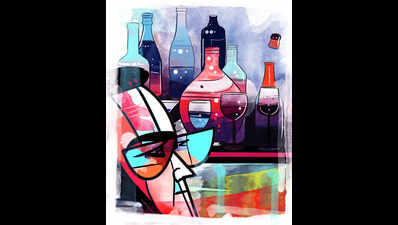- News
- City News
- ahmedabad News
- No HC relief for Daman wine shop owner facing bootlegging charges
Trending
No HC relief for Daman wine shop owner facing bootlegging charges


His and his wife’s names cropped up in the statements given by two accused who were nabbed by the cops and their truck carrying liquor worth Rs 20 lakh seized.
Nine years later, Patel wanted the charges against him to be dropped on the grounds that he owns a liquor shop in Daman, which is a Union territory and where liquor is not a prohibited commodity.
He said his wife too had licences to conduct retail and wholesale liquor business. His counsel argued that a person cannot be booked merely on the basis of statements given by the co-accused. Moreover, the couple owns a shop and there was no illegality committed in selling the liquor stock since the Gujarat Prohibition Act is not applicable in Daman, it was contended. The state govt opposed Patel’s plea, stating that since a huge quantity of liquor was seized, it was necessary to interrogate him.
Justice Nirzar Desai was not inclined to quash the FIR and pointed out from the case papers that the police investigation revealed that several phone calls were made between the applicant and the men arrested in the case. As the court was reluctant in granting relief to Patel, his lawyer withdrew the petition.
Earlier this year, Daman Wine Merchants’ Association filed a PIL complaining that Gujarat police booked wine sellers from the Union territory in prohibition cases based on the statements given by bootleggers and requested the court’s intervention. The HC, however, turned down the PIL terming it “misconceived”.
We also published the following articles recently
HC quashes rape FIR against bizman filed by Chhatarpur cops on lower court orders
MP High Court quashes rape FIR against businessman due to malicious prosecution. Woman accused of running honeytrap racket. Learn more about the court's decision and the history of similar complaints in different locations.
MP High Court quashes rape FIR against businessman due to malicious prosecution. Woman accused of running honeytrap racket. Learn more about the court's decision and the history of similar complaints in different locations.
High time govt rethinks liquor policy: HC
Learn about the Madras high court's call for the state govt to review its liquor policy for the welfare of the public. Find out more about the rules governing the location of liquor shops near religious and educational sites.
Learn about the Madras high court's call for the state govt to review its liquor policy for the welfare of the public. Find out more about the rules governing the location of liquor shops near religious and educational sites.
Saanand Verma recalls hardships his parents faced and yet encouraged him to pursue his passion'
Learn about actor Saanand Verma's inspiring journey in the entertainment industry, from his parents' struggles to his diverse roles in films like 'Bhabiji Ghar Par Hai' and 'India Lockdown'. Discover his approach to acting and his dedication to constantly evolving as an artist.
Learn about actor Saanand Verma's inspiring journey in the entertainment industry, from his parents' struggles to his diverse roles in films like 'Bhabiji Ghar Par Hai' and 'India Lockdown'. Discover his approach to acting and his dedication to constantly evolving as an artist.
End of Article
FOLLOW US ON SOCIAL MEDIA










